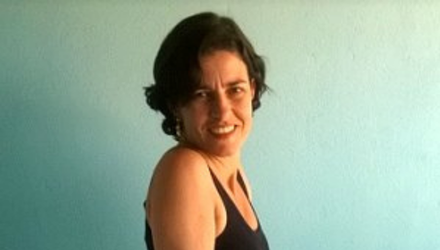Name: Deniz Nascimento de Santana
Age: 38
Where do you call home? I was born and live in Antônio Gonçalves, a small town in the countryside of Bahia State, in the Northeast of Brazil.
Education: I have a degree as a teacher’s assistant, and I have finished high school.
Who do you live with? I am divorced and live with my 15 year old daughter
What is a typical day for you? This is my daily routine: twice a week I have physical therapy or pilates (I alternate every two months) + acupuncture, once a week I have a speech therapist, once a week I talk to my psychologist, on Sundays i go to church and the spare time i spend at my little store. It helps me pay the bills and keeps my mind busy doing what I like. At night, I watch a little bit of TV before going to bed. Well, I have to change a little bit what I said. This was my routine before the pandemic. Pilates, psychologist and church are now virtual. I went through the last 8 months without therapy and some of my business clients have become virtual.
How long have you known you are living with FA? I’ve been living with Friedreich’s ataxia since I was 18. I was diagnosed with FA because my symptoms were similar to what another family member had. An MRI and a genetic test confirmed it.
Are there any others with FA in your family? Yes, my older brother.
Describe your transition from walking to walker/wheelchair. My level of stress was very high when my divorce happened. It really affected me, and I clearly felt that FA was progressing fast, to the point that I needed a walker to help me with my mobility.
What do you like to do to stay active and what type of exercises work for you to stay strong? I really enjoy doing Pilates and my physical therapy sessions.
Do you have any hobbies or special interests? I watch a lot of movies and series on TV. I am happy if I am still able to do some dance classes.
What is a good trick to make daily life easier? I think that a good trick is to please your mind and body with positive thoughts and pleasant exercises. We all have our daily pains and deserve a little bit of happiness.
When FA gets you down, what do you think/do to feel better? I think about the opportunities still at my reach to experience good moments. Being down only brings trouble and debilitates our bodies.
What is one way living with FA has POSITIVELY affected your life? I don’t know how to translate that into words but I can say that I totally changed my way of doing things and dealing with my daily challenges. I learned to listen more to what other people say and to have a better diet, for example. It made me grow up stronger and more mature. I do things and make decisions thinking about being happy and doing no harm to anyone.
What is a favorite motivational quote of yours? “God enters an exclusive door in each individual”
What is a piece of advice that someone with FA has given you that encourages and inspires you? I can’t recall any.
What is the best advice you could give to a person who has been newly diagnosed with FA? At the beginning we are all shaken and think that this is the end of everything. But this is just the first impression. The quicker we get out of the hole, the quicker we find a sense of purpose and even feel physically better.
What is the first thing you want to do when a cure/treatment is found? My dream is to travel a lot and learn again how to dance.
“I have FA but FA doesn’t have me”. What does this statement mean to you? How do you live your life in the face of adversity? I know that I have a debilitating disease but I don’t let it limit me. I try to live life the best way possible. I think it is a good trick to keep some part of FA away.
Tell us a little more about you… I was born and live in a small town in a remote area that doesn’t have many options to have fun. In our childhood we created our own toys / plays with whatever materials we found available. Most of my friends from that time are still around, and we are always in touch even though we are/were married and have children. My neighbors in the entire street have been the same for decades. Every marriage has its highs and lows and my wasn’t different: I was married for 10 years, had good and not so good moments, and the best thing that happend from that experience is my daughter. She is my caretaker and my friend. I have a large and loving family, and it is a blessing. A good family and good friends are important in the life of any person, and they are even more important when you have a disability. After 20 years with FA, I keep trying not to be sad for too long because I know that being that way I may lose good opportunities that life still can offer us. It is enough reason to fight for treatment and cure.
Interview by
Natache Iamaya Gomez
